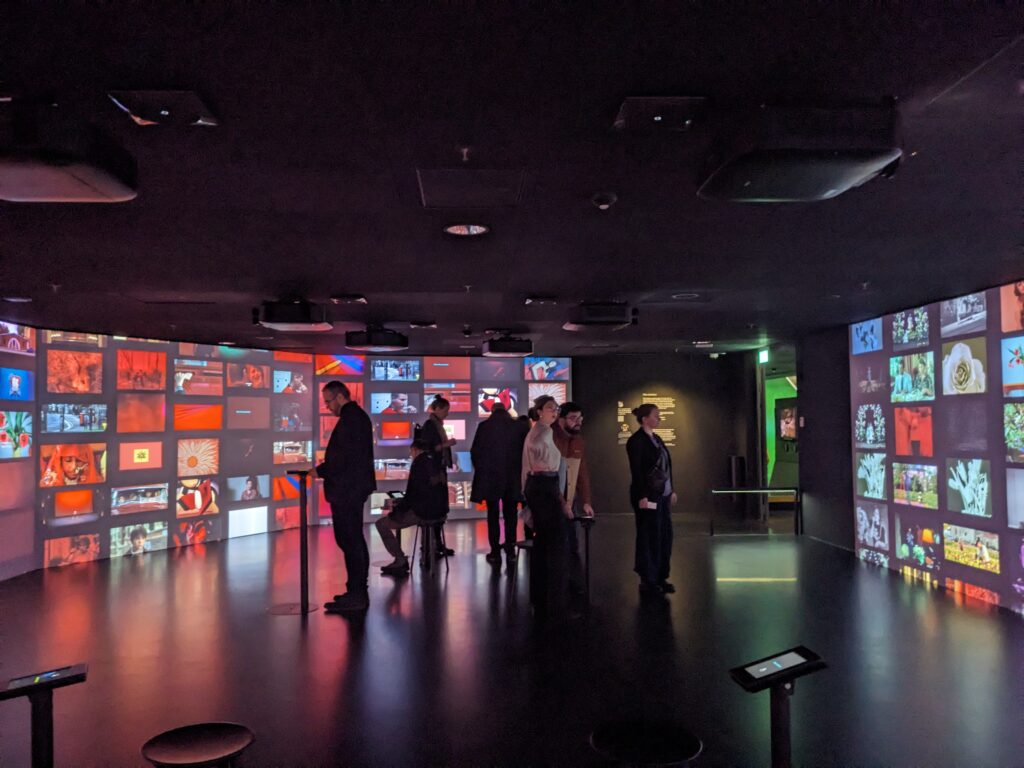 News
News
DIGHT-Net Workshop Report: Archives and the Archivist as Narrative Agent? 16–18 January 2025
January 21, 2025

On 16–18 January 2025, the Amsterdam School for Heritage, Memory, and Material Culture (University of Amsterdam) hosted a DIGHT-Net workshop dedicated to examining digital heritage collections as narrative constructions. Through practical and theoretical lectures, discussions and site visits, we investigated the influence of digital methodologies on the curation, contextualisation and accessibility of collections to diverse audiences. The event was attended by researchers and practitioners from Dutch and European universities, and research and heritage institutes.
After a welcome by Prof. Ihab Saloul (UvA), who reflected on the narrative agency of the archive in relation to digitisation, the workshop’s first day commenced at the University Library with a presentation by Cindy Zalm and Bob Ketting on 3D representations at the Dutch Wereldmuseum. By discussing the digital exhibition Deshima Experience, they expanded on the advantages of digital renderings of the museum’s colonial objects for research, archival, storytelling and community-based needs. Thereafter, Dr. Christian Olesen (UvA) offered a reconceptualization of how computational means can provide access to digital audiovisual collections. By emphasizing the collections’ sensory features, Christian provided vital considerations for the advantages of multimodal interfaces for complementing traditional catalogues and allowing visitors to better explore the audiovisual archive along auditory, visual, embodied or even poetic axes.
To complement these stimulating talks, the participants visited Amsterdam’s City Archives, where Merel Geerlings expanded on the institute’s efforts in digitising the sources and enhancing their accessibility through linked data methods and AI applications. Moreover, she provided a tour through the City Archives’ collections, including a look at the Archive of the Amsterdam Notaries 1578–1915, part of the UNESCO Memory of the World Register. The day was concluded with a shared dinner in Amsterdam’s city centre.
The following day, the workshop continued with a lecture by Prof. Julia Noordegraaf (UvA), based on her and Anna Schjøtt Hansen’s (UvA) fieldwork at the Sound & Vision Media Museum. This screen-based exhibition, she argued, illustrates how embedded we are in media by turning the visitor into a datafied participant and personalising the exhibition’s narrative and audiovisual content based on user-provided data. The lecture thereby raised important questions on the democratising potential of digital archives and questions of human/non-human agency in AI.
Continuing the programme, Emanuela Varga (UvA) argued for the usage of the ‘maze’ as a concept to understand the multimodal narrative script underlying archives and (digital) exhibitions. Through aesthetic, innovative and user-friendly means, such multicursal structures can provide new ways of engaging in digital storytelling. Thereafter, Wiebe Reints (NIOD Institute for War, Holocaust and Genocide Studies) presented possibilities and problems when digitising colonial collections. While promising more transparent and dialogical connections that facilitate the decolonisation of the archive, Wiebe explained how digital infrastructures also pose questions on the perpetuation of colonial patterns present in the database, and for whom and how access to the digital collection is granted.
In the afternoon, Prof. Charles Jeurgens (UvA) elucidated how AI-driven approaches toward digital collections can facilitate the ‘unsilencing’ of marginalised voices. Exemplified by his research into the genre of testaments of employees of the Dutch East India Company, he highlighted the innovative insights made possible by digitalisation, while stressing the necessity of transparent communication on the ethics informing digital methodologies. Ethical concerns also informed the presentation of Dr. Bidisha Chaudhuri (UvA), wherein she discussed India’s employment of a biometric system for welfare benefits. By highlighting the risks of everyday structural violence enacted by the reductionist biometric system, she exemplified the necessity of questioning the ethics of digital techniques, especially when they directly impact human lives.
In the programme’s final presentation, the digital ethics question was continued, this time in relation to the sensitive issue of human remains in archaeology. Dr. Hayley Mickleburgh and Heide Barten (UvA) presented their development of an educational game through which archaeology students can learn about the ethics surrounding human remains. Through interactive digital storytelling and gamification, historical empathy is generated amongst the students by stressing the person behind the object, thus equipping them for the sensitivities of the decision-making process necessary in archaeological research. After a concluding discussion led by Prof. Ihab Saloul and Prof. Marek Tamm (Tallinn University) wherein they looked ahead to DIGHT-Net’s upcoming events, the discussions instigated by the thought-provoking presentations were continued over a shared dinner.
The third and final day of this workshop entailed a site visit to the Eye Filmmuseum, where the DIGHT-Net members experienced some of the practices discussed in the previous days. After this exploration of Dutch audiovisual heritage, the workshop wrapped up with a canal boat cruise along the Amsterdam Light Festival route that highlighted Amsterdam’s vibrant heritage landscape, followed by a final dinner.
During the upcoming workshop at Tallinn University on Building the Digital Archive of a Scholar, and through Turku University’s online workshop series New Trends in Digital Culture Studies and Gender, Intersectionality and Inclusion in Digital Cultural Heritage, we look forward to continuing our discussions.
Marjolein Uittenbogaard
